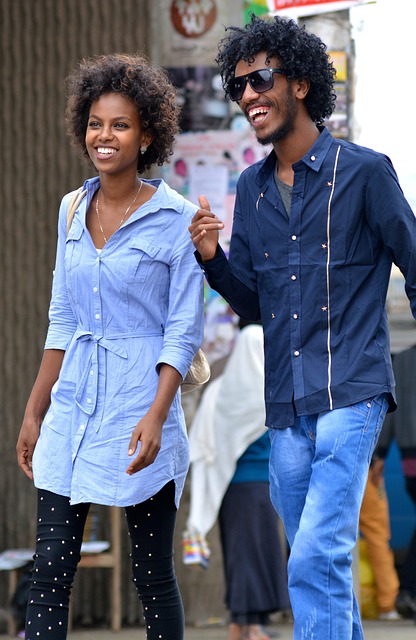Modern Love: How Dating Has Evolved Over The Decades
In the ever-changing landscape of dating, the way we pursue love and form connections has evolved significantly over the decades. From traditional courtship rituals to the tech-savvy world of online dating, this article delves into the fascinating journey of modern love. Discover how societal norms and technological advancements have shaped dating behaviors and influenced our quest for companionship. Whether you’re a hopeless romantic or simply curious about the changes in dating dynamics, this exploration of the evolution of love will surely captivate your attention.
Technology and Dating
Online dating
Online dating has revolutionized the way people meet and connect with potential partners. Gone are the days when meeting someone meant relying solely on chance encounters or introductions from friends. With online dating platforms, you have the ability to search for and interact with a vast number of individuals who share your interests and values. This convenience and accessibility have made online dating increasingly popular, especially among busy professionals or those living in areas where social opportunities may be limited.
Dating apps
Dating apps have taken online dating to the next level, providing users with a streamlined and user-friendly experience. These apps allow you to create a profile, browse through other users’ profiles, and communicate with potential matches all from the convenience of your smartphone. The swipe-based interface has become synonymous with dating apps, allowing you to quickly browse through numerous profiles and make snap judgments. Dating apps have not only made the process of finding a partner more efficient but also offer a certain level of excitement and anticipation with every swipe.
Social media and dating
Social media has also played a significant role in changing the dating landscape. Platforms like Facebook, Instagram, and Twitter have become more than just tools for staying connected with friends and family; they have become stages for carefully curated self-presentation. With the ability to showcase your life, interests, and personality through posts and photos, social media has become a powerful tool for attracting potential partners. It has also become a way to learn more about someone before even going on a date, as you can get a glimpse into their daily life and interests through their social media presence.
Changing Gender Roles
Traditional gender roles
Traditional gender roles in dating often dictated that men take on a dominant and proactive role, while women were expected to be passive and receptive. Men were typically responsible for initiating and planning dates, paying for meals, and taking on the role of protector and provider. Women, on the other hand, were expected to be nurturing, supportive, and submissive. These rigid gender roles influenced not only behavior within relationships but also societal expectations of what a romantic partnership should look like.
Gender equality in dating
In recent years, there has been a significant shift towards gender equality in dating. With the rise of feminist movements and increased awareness of gender biases, traditional gender roles have been challenged and reevaluated. Today, it is increasingly common for both men and women to take on active roles in dating, from initiating conversations to planning dates and even splitting the bill. This shift towards equality has created more balanced and egalitarian relationships, where both partners have a say in decision-making and contribute equally to the relationship’s success.
Women making the first move
An exciting change in dating norms has been the rise of women making the first move. Traditionally, it was expected for men to make the initial approach and express romantic interest. However, more and more women are taking charge and seizing the opportunity to express their interest and pursue potential partners. This shift not only empowers women in their dating lives but also challenges societal expectations and stereotypes surrounding gender roles. By making the first move, women can take control of their romantic destiny and actively pursue the connections they desire.
Shift in Dating Norms
Casual dating
Casual dating has become increasingly prevalent in modern society. This shift in dating norms recognizes that not every connection has to develop into a long-term commitment. Casual dating allows individuals to explore their desires, connect with different people, and have fun without the pressure of exclusivity or long-term expectations. It provides an opportunity to learn more about oneself and what one wants in a partner, without the need for immediate commitment.
Open relationships
Open relationships, once considered taboo, have gained acceptance and popularity in recent years. Open relationships involve partners who have agreed to, and are comfortable with, engaging in romantic or sexual relationships with other individuals outside of their primary partnership. This shift challenges the idea that monogamy is the only valid form of romantic connection and allows individuals to explore different types of relationships while maintaining emotional and/or financial commitments to their primary partner.
Long-distance relationships
Advancements in technology have also contributed to the rise of long-distance relationships. With the ability to connect instantly through video calls, messaging apps, and social media, distance is no longer the insurmountable barrier it once was. People are increasingly open to dating and committing to partners who live in different cities or even countries. While long-distance relationships require effort and communication, they offer the opportunity for personal growth, independence, and the chance to create a strong foundation based on emotional connection.
Changing Definition of Love
Romantic love vs. companionship
The definition of love has evolved over time, with a greater emphasis being placed on companionship rather than solely romantic love. While romantic love involving intense passion and infatuation is still highly valued, the desire for a deep emotional connection and a strong bond based on mutual respect and support has become increasingly important. In today’s dating landscape, individuals are seeking partners who not only ignite their passion but also fulfill their emotional needs and provide a sense of companionship and partnership.
Polyamory and non-traditional relationships
Polyamory, the practice of having multiple simultaneous romantic relationships with the knowledge and consent of all involved, has also gained visibility and acceptance. This non-traditional approach to love challenges societal norms around monogamy and questions the idea that one person can meet all of our emotional and physical needs. Polyamory acknowledges that different relationships can provide unique and fulfilling experiences, and that love is not limited or confined by traditional boundaries.
Changing expectations in relationships
As society evolves, so do our expectations in relationships.
Impact of Feminism on Dating
Feminist movement and dating
The feminist movement has had a profound impact on dating dynamics, challenging traditional gender roles and reshaping expectations. The movement has empowered women to assert their wants and needs and demand equality within their relationships. Feminism has sparked conversations about consent, respect, and communication, fostering healthier and more balanced interactions between partners. It has also encouraged men to redefine their roles and expectations, establishing a foundation of mutual respect and understanding.
Empowerment in relationships
Feminism has empowered individuals in relationships to prioritize their own well-being, personal goals, and ambitions. It has encouraged the recognition that both partners deserve to be treated with dignity and respect, and that no one should be confined to restrictive gender roles or societal expectations. Women, particularly, have been empowered by the feminist movement to assert their boundaries, express their desires, and make decisions that align with their personal values and aspirations.
Negotiating power dynamics
Feminism has prompted discussions around power dynamics within relationships and the importance of equity and balance.
Dating and Technology Addiction
Digital distractions in dating
With the proliferation of smartphones and other digital devices, technology has become a double-edged sword in the dating world. While it provides unprecedented access to potential partners, it also poses significant distractions. Constant notifications, social media scrolling, and the allure of endless entertainment options can divert attention and focus from meaningful face-to-face interactions. It is crucial to strike a balance and cultivate digital habits that prioritize genuine connections over mindless scrolling.
Addiction to dating apps
Dating apps have become incredibly popular, but some individuals may find themselves becoming addicted to the constant validation and excitement these platforms offer. The gamified nature of swiping and the fast-paced nature of app-based dating can create a cycle of addiction, where the pursuit of more matches and superficial connections takes precedence over genuine emotional connections.
Impact on communication skills
Technology has undoubtedly reshaped communication in relationships. While it has made it easier to connect with others, it has also brought challenges. Some people may struggle with face-to-face communication skills, preferring the safety and control of digital interactions. Technology can hinder the development of important interpersonal skills, such as active listening, non-verbal communication, and empathy. It is important to be aware of these potential pitfalls and actively work to cultivate strong communication skills, both online and offline.
Rise of Virtual Dating
Video dating
Virtual dating has gained momentum, especially during the COVID-19 pandemic. Video dating platforms allow individuals to connect and interact in a more personal way, even when physical proximity is not possible. Video calls offer the opportunity to see facial expressions, hear tone of voice, and gauge chemistry, despite being physically distant. Virtual dating provides a safe and convenient alternative for connecting with potential partners, making it an increasingly popular choice in the modern dating landscape.
Virtual reality dating
The integration of virtual reality (VR) technology into the dating world has opened up new possibilities for immersive and interactive experiences. VR dating allows individuals to create virtual avatars and engage in lifelike interactions with others in a virtual world. It offers a unique opportunity to transcend physical limitations and experience virtual dates and relationships that feel real. While still in its early stages, VR dating shows great potential for providing individuals with novel and exciting ways to connect and form relationships.
Connecting during the pandemic
The COVID-19 pandemic has fundamentally changed the way we date and connect with others. Lockdowns and social distancing measures have made physical proximity challenging, leading to a surge in virtual connections and a return to more traditional forms of courtship. These circumstances have forced individuals to reimagine dating, finding creative ways to connect, and deepen emotional bonds while maintaining physical distance.
Changing Perceptions of Sexuality
Acceptance of LGBTQ+ relationships
The acceptance and recognition of LGBTQ+ relationships have grown significantly over the years.
Fluidity of sexual identities
The concept of fluidity has emerged as a significant shift in the perception of sexuality. More people are embracing the idea that sexual orientation and identity can be fluid, rather than fixed labels. This understanding acknowledges that individuals may experience changes or shifts in their attractions over time, and that these experiences are valid and should be respected. This shift toward accepting fluidity in sexual identities has allowed for a more nuanced and comprehensive understanding of human sexuality.
Representation in media
The representation of diverse sexual orientations in media has played a crucial role in changing perceptions of sexuality and normalizing LGBTQ+ relationships. Increased visibility and positive portrayals of LGBTQ+ characters and relationships in television, film, and other forms of media have helped to challenge stereotypes and foster greater acceptance in society. By showcasing a range of diverse and authentic LGBTQ+ experiences, media has created opportunities for people of all sexual orientations to see themselves represented and celebrated.
Dating in the Digital Age
Ghosting and digital rejection
One significant challenge of dating in the digital age is the prevalence of ghosting and digital rejection. With the ease of online communication, it has become all too common for individuals to abruptly cut off contact or disappear without explanation. Ghosting can leave the person being ghosted feeling confused, hurt, and rejected. It is essential to prioritize open and honest communication, treating others with respect and compassion, even in the digital realm, to mitigate the negative impact of ghosting.
Misrepresentation and catfishing
Online dating platforms have also brought about the issue of misrepresentation and catfishing. People may create false or misleading profiles, using outdated or heavily edited photos, or lying about their characteristics and intentions. This deceptive behavior can lead to disappointment, heartache, and even potential harm. It is crucial to approach online interactions with skepticism, take the time to verify information, and listen to gut instincts when something feels off.

Online safety and precautions
Dating in the digital age requires taking precautions to ensure personal safety. It is important to be mindful of sharing personal information too quickly, to be wary of individuals who seem too good to be true, and to choose public places for initial meetings. Online platforms typically offer safety features such as reporting and blocking options, which should be used if encountered with inappropriate or suspicious behavior. Additionally, it is essential to trust your instincts and prioritize personal safety when venturing into the world of online dating.
The Future of Dating
Artificial intelligence in matching
The future of dating holds exciting possibilities with the integration of artificial intelligence (AI) in matching algorithms. AI has the potential to analyze vast amounts of data, including user preferences, interests, and behaviors, to facilitate more accurate and compatible matches. This technology aims to improve the matching process, ultimately leading to more successful and fulfilling connections. By utilizing AI, dating platforms can provide users with better compatibility assessments, increasing the chances of finding a truly compatible partner.
Virtual companionship
As technology continues to advance, the concept of virtual companionship is emerging as a possibility.

Impact of technology advancements
As technology continues to evolve, it is inevitable that it will continue to shape the future of dating.
In conclusion, dating has evolved significantly over the decades, with technology playing a substantial role in these changes.







